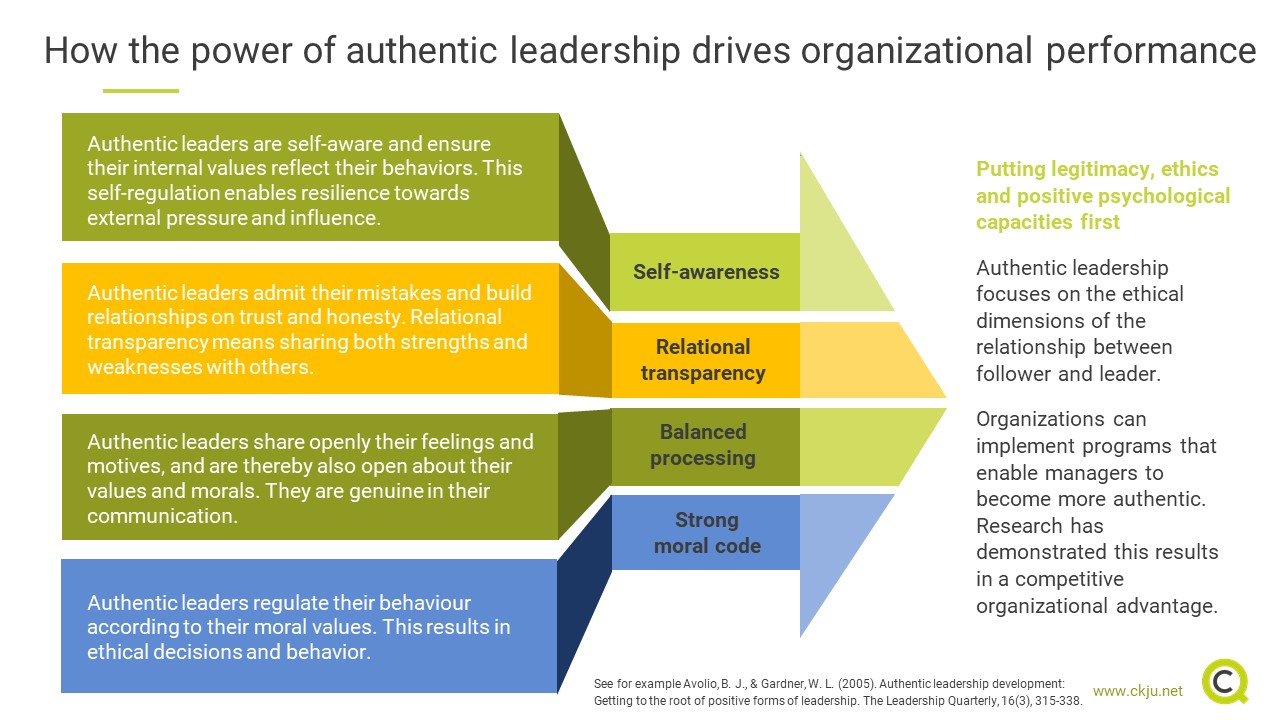- All Management Learning Resources
- authentic leadership

Executive summary
This CQ Dossier focuses on the topic of authentic leadership which emphasizes the importance of leaders building honest and transparent relationships with their followers. The dossier describes the key component of authentic leadership and also describes how organizations can best identify and develop these behaviors in management.
Contents
- Executive summary
- Authentic leaders put legitimacy, ethics and positive psychologial capacities first
- Authentic leadership consists of four components
- Authentic leaders are characterized by a high level of self-awareness
- Authentic leaders admit mistakes and share their successes
- Authentic leadership is connected with sharing feelings and motives
- Authentic leaders have an internalized moral perspective
- Organizations can implement authentic leadership programs
- Key take-aways
- References & further readings
Authentic leaders put legitimacy, ethics and positive psychologial capacities first
Authentic leadership emphasizes how a leader can gain legitimacy and build trust through developing honest relationship with followers (Avolio & Gardner, 2005). Authentic leadership is defined in the following way:
"A pattern of leader behavior that draws upon and promotes both positive psychological capacities and a positive ethical climate, to foster greater self- awareness, an internalized moral perspective, balanced processing of information, and relational transparency on the part of leaders working with followers, fostering positive self-development." (Walumbwa et al., 2008 p. 94).
This approach to leadership focuses on the ethical dimensions of the relationship between follower and leader and describes those behaviors that result in a trusting relationship. Authentic leaders have a positive outlook on life and are truthful and open in their interactions with others. They build trust with their subordinates and generate enthusiasm for project which enables effective individual and team performance.
Many researchers and practitioners have advocated for organizations to embrace the concept of authentic leadership because it can lead to stronger relationships and a commitment to the vision of the organization. The authentic leadership approach advocates for ethical standards rather than a focus on profit (Garner, Cogliser, Davis & Dickens, 2011).
Authentic leadership consists of four components
The research on authentic leadership suggests that there are four major components including
- self-awareness,
- relational transparency,
- balanced processing, and
- an internalized moral perspective.
An authentic leader shows self-awareness through reflecting on their own strengths, weakness and values. An authentic leader truly knows themselves and values their gifts and recognizes their limitations.
When authentic leaders demonstrate relational transparency, they openly share their own thoughts and beliefs yet do not overly display their emotions to followers; they maintain a good balance.
Moreover, authentic leaders are balanced in their approach because they solicit opinions from subordinates and welcome opposing viewpoints and consider the value of these viewpoints in a fair manner.
Authentic leaders also display a strong moral code that they demonstrate in their relationships and decision-making; this ethical foundation resistant to external forces.
Management skills newsletter
Join our monthly newsletter to receive management tips, tricks and insights directly into your inbox!
Authentic leaders are characterized by a high level of self-awareness
Some researchers have questioned whether authentic leadership includes a moral component because authentic leaders might be true to corrupt ideas. However, Bruce Avolio and other scholars have argued that faking ethical constraints is a sign of inauthenticity and that authentic leaders need to be both truthful and ethical.
Moreover, it is difficult to be self-aware, transparent, and balanced in processing information without the moral maturity associated with a positive personal value system (Avolio & Gardner, 2005). Authentic leaders show self-awareness through ensuring that their internal values reflect their behaviors and this process of self-regulation enables authentic leaders to withstand external pressure and influence.
Authentic leaders admit mistakes and share their successes
It is important to distinguish relational transparency from impression management. Authentic leaders do not engage in impression management strategies yet persist in aligning their core values with their intentions and behaviors within the firm. Both leaders and followers who engage in relational transparency have authentic relationships that derive from building trust and honesty. When a leader displays relational transparency they share both their strengths and weaknesses with others. They display authenticity through admitting when they make mistakes and sharing their successes with their subordinates.
Authentic leadership is connected with sharing feelings and motives
In displaying relational transparency, authentic leaders share their feelings and motives. Authentic leaders are connected with their values and morals and share these values openly with others. When authentic leaders show relational transparency they communicate openly and are “real in their relationships with others” (Northouse, 2013, p 264).
Without sharing sensitive information, authentic leaders are open and honest in a genuine way and choose to share appropriate information. This aspect of authentic leadership demonstrates high self-awareness because authentic leaders understand what drives them to do well and allows them to build strong and authentic relationships with their followers.
Authentic leaders have an internalized moral perspective
This level of relational transparency is based on authentic leaders having an internalized moral perspective so they regulate their behavior according to their moral values. This internalized moral perspective results in ethical decision-making and behavior. Moreover, authentic leaders balance information before making a decision and they based these decisions on their core set of values.
Organizations can implement authentic leadership programs
It also appears that organizations can implement authentic leadership programs to enable managers to become more authentic. The concept of authentic leadership is based on a mixture of individual differences and skills so is a multi-dimensional concept. These types of training and development programs can focus on allowing managers to become more self-aware so they are in tune with their values (Avolio, Griffith, Wernsing, & Walumbwa, 2009).
For organizations to gain a competitive advantage through positive leadership, researchers and practitioners have advocated for identification and development of authentic leadership. This CQ Dossier describes the four key components of authentic leadership with a particular focus on development of self-awareness in order for managers to process information more effectively, be transparent and honest with their subordinates, and to develop a strong moral core that is congruent with their values and ethics. The dossier also suggests that organizations can develop authentic leadership interventions that allow managers to become more self-aware.
Key take-aways
- Authentic leadership is a powerful and positive source of leadership for organizations
- Authentic leaders are self-aware and have a strong set of moral values
- Authentic leaders are balanced in the decisions that they make and ensure that these decisions are aligned with their moral perspective
- Authentic leaders are transparent with their subordinates and build strong relationships through being honest and genuine
- Organizations can develop training interventions that allow managers to become more authentic through raising self-awareness
References & further readings
Avolio, B. J., Griffith, J., Wernsing, T. S., & Walumbwa, F. O. (2009). What is authentic leadership development? Oxford Handbook of Positive Psychology and Work.
Avolio, B. J., & Gardner, W. L. (2005). Authentic leadership development: Getting to the root of positive forms of leadership. The Leadership Quarterly, 16(3), 315-338.
Gardner, W.L., Cogliser, C.C., Davis, K.M., & Dickens, M.P. (2011). Authentic leadership: A review of the literature and research agenda. Leadership Quarterly, 22, 1120-1145.
Northouse, P.G. (2013). Leadership: Theory and Practice. Los Angeles: Sage.
Walumbwa, F. O., Avolio, B. J., Gardner, W. L., Wernsing, T. S., & Peterson, S. J. (2008). Authentic leadership: Development and validation of a theory-based measure. Journal of Management, 34, 1, 89-126
About the Author






